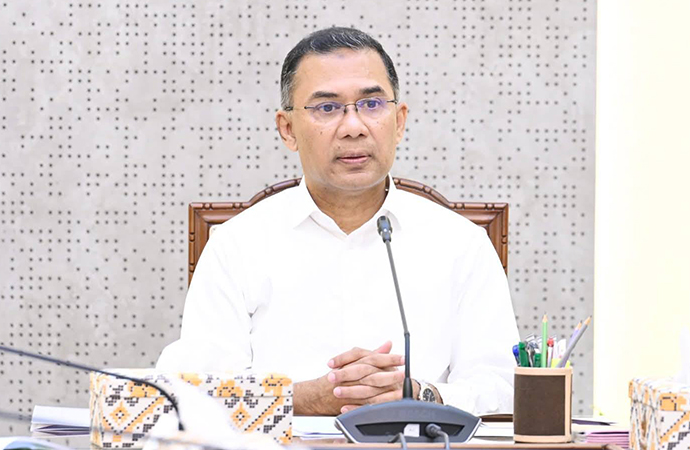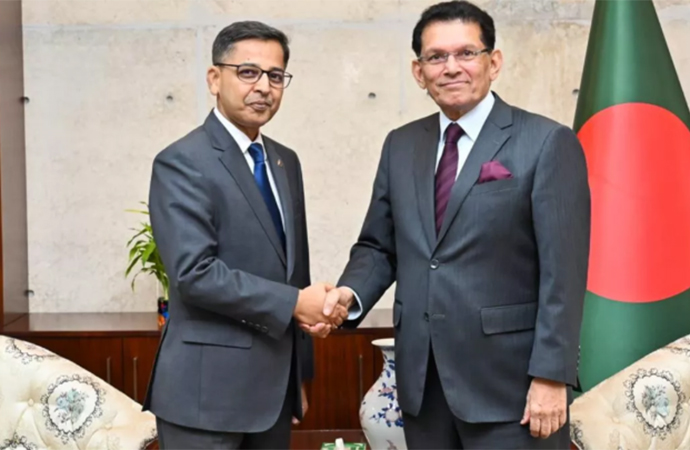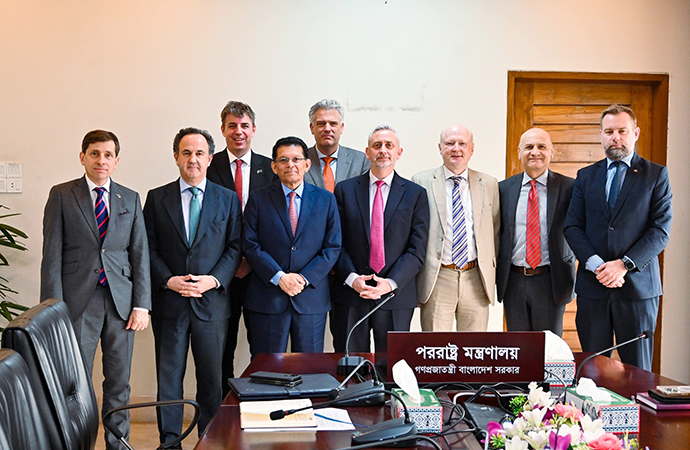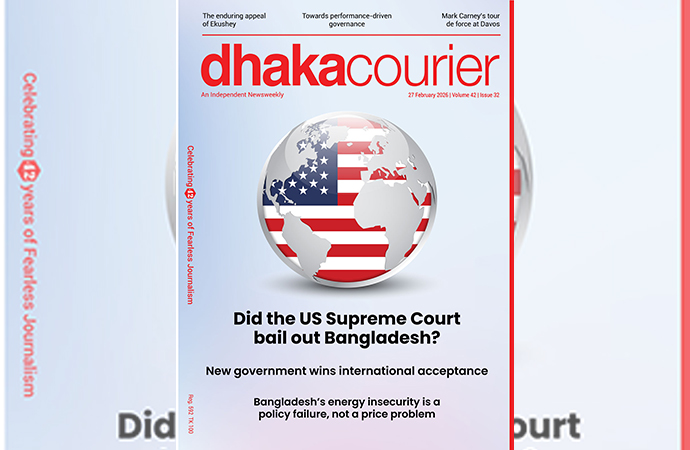Global

freepik
Despite being adorned with captivating natural landscapes and cultural treasures, Bangladesh teeters on the precipice of an impending calamity instigated by the relentless force of climate change. Positioned at the forefront of this global crisis, Bangladesh emerges as one of the most profoundly impacted nations, succumbing to the relentless onslaught of climate change. With the alarming surge in global temperatures, an urgent and concerted international response has been elicited, underscoring the gravity of the situation. Albeit its pivotal role in bolstering the economy and facilitating employment opportunities, the tourism industry remains alarmingly vulnerable to the far-reaching ramifications of this climatic upheaval.
Bangladesh's distinctive geography and topography render the nation exceptionally vulnerable to the perils of natural calamities, engendering an acute sense of danger. Though the country exhibits remarkable resilience in swiftly recuperating from such adversities, the disconcerting veracity lies in the mounting frequency and heightened intensity of these cataclysmic events instigated by the escalating specter of climate change. Illustratively, the Sundarbans, the largest expanse of mangrove forests on the globe, bestows a poignant exemplification. Revered as a UNESCO World Heritage site, this ecological marvel has abundant botanical and zoological diversity. Alas, the relentless rise in sea levels and the escalating encroachment of salinity precipitate an accelerated degeneration of its resplendent flora and fauna. Given that the Sundarbans lure tens of thousands of tourists annually, their demise would impart a profound and calamitous blow to the burgeoning tourism sector of Bangladesh.
Cox's Bazar, synonymous with the allure of an unbroken expanse of sandy coastline, confronts a similar fate as the repercussions of escalating storm surges and surging sea levels loom ominously. While the very essence of this renowned beach is imperiled, the adjoining communities are inextricably reliant on the influx of tourism as a crucial source of livelihood. Notably, the adverse ramifications of climate change reverberate far beyond marine and coastal tourism alone. Unforgiving meteorological phenomena and inundation of the hinterland pose an existential threat to revered cultural landmarks emblematic of Bangladesh's historical richness. The medieval city of Paharpur and the Buddhist Vihara of Somapura stand as poignant examples, vulnerable to the ravages of extreme weather events and pervasive flooding. Regrettably, as the integrity of these cherished landmarks deteriorates, a consequential diminution in visitation ensues, precipitating a deleterious ripple effect on the local economy.
The tourism sector bears the brunt of climate change's indirect repercussions on vital infrastructure, inducing profound ramifications. Highways, hotels, and airports, integral components of the tourism infrastructure, stand precariously exposed to heightened risks of damage owing to the escalating frequency of severe weather phenomena. This unwelcome reality engenders a real deterrent, rendering travel less alluring and more arduous. Drawing wisdom from the experiences of other nations, we have the opportunity to glean invaluable insights into effective coping mechanisms. Notably, low-lying countries like Bangladesh can glean inspiration from the Netherlands, where innovative initiatives such as the visionary 'Room for the River' undertaking have been successfully implemented. This forward-thinking approach facilitates controlled flooding in designated areas, safeguarding lives and property. Regrettably, the government of Bangladesh has yet to embark upon similar endeavors. Nonetheless, coastal Bangladesh's cherished tourist hotspots and interconnected infrastructure can be preserved by making suitable adaptations to this method. Akin to Venice, Italy, which grapples with the disquieting implications of climate change, investments in movable barriers that emerge from the sea floor to impede surging tides, and forestall inundation represent a prudent course of action. Given the eminence of Cox's Bazar as a favored tourist destination, it becomes imperative to prioritize enhancing local infrastructure, thereby assuring the safety and well-being of visitors.
In light of these insights and Bangladesh's unique challenges, we offer the following comprehensive recommendations:
● Planned tourism should include adaptation to climate change, which means anticipating the impacts of climate change on popular destinations and implementing eco-friendly measures to mitigate any adverse effects.
● Build climate-resilient infrastructure that can withstand changing temperatures and intense weather. Highways, hotels, and other tourist infrastructure need to be improved to withstand the effects of natural disasters better.
● Tourists should be encouraged to adopt eco-friendly practices. The effects of climate change can be mitigated if tourists adopt eco-friendly practices like recycling and cutting back on their carbon footprints. To do this, sustainable tourism activities should be encouraged.
● There must be better early warning systems and procedures for coping with natural disasters to protect locals and visitors. One way to do this is to provide adequate financial aid to businesses hit by climate-related natural disasters.
● Create campaigns to inform visitors, residents, and industry players of the impacts of climate change on the tourism industry and how they may help mitigate these effects. Initiate Talks with Important People. This can be achieved through educational campaigns, visitor centers, interpretation programs, and integrating climate change topics into school curricula. Increasing knowledge and understanding can foster responsible tourism behavior among both tourists and local communities.
● Developed countries should help Bangladesh and other developing countries adapt to and reduce the impacts of climate change by cutting their carbon emissions and providing financial and technological support for such efforts. The same can be said about Bangladesh.
● Encouraging building sustainable transportation infrastructure, such as developing cycling infrastructure, promoting carpooling, and supporting using renewable energy in transportation, can contribute to a more sustainable tourism industry.
● Water conservation and management keeping the tourism industry in mind. This involves ensuring efficient water management practices, for example, rainwater harvesting, wastewater treatment, and responsible water usage in hotels and resorts, which can help mitigate the strain on water resources and reduce the industry's environmental impact.
● Should introduce green certification for hotels and resorts near natural disaster zones. Teaching and promoting green certifications and standards for accommodations, restaurants, and tour operators can incentivize sustainable practices within the tourism industry. Certifications like LEED (Leadership in Energy and Environmental Design) and eco-labels can help guide tourists towards environmentally responsible choices while providing recognition to businesses that prioritize sustainability.
● Higher mutual collaboration with local communities to ensure adequate output in the tourism industry is needed. Encouraging research and innovation in sustainable tourism practices and climate change adaptation can provide valuable insights and solutions. Supporting research initiatives, funding innovation projects, and fostering partnerships between academia, industry, and government can drive continuous improvement and adaptation within the tourism sector.
Climate change substantially threatens Bangladesh's tourism industry, rendering its profound repercussions readily perceptible. Drawing upon the wisdom gained from global encounters, it becomes imperative to integrate measures for mitigating and adapting to climate change within the sector's overarching planning and strategic framework. In safeguarding Bangladesh's invaluable reservoir of cultural heritage and unparalleled natural splendor, a holistic approach that embraces collaborative endeavors becomes the sine qua non for securing these treasures for future generations.
Dr. Mohammad Shahidul Islam, Assistant Professor of Marketing, BRAC Business School, BRAC University. e-mail: mohd.sh.islam@bracu.ac.bd and Farin Sabrina, BBA Student, BRAC Business School, BRAC University. E-mail: farin.sabrina@g.bracu.ac.bd

























Leave a Comment
Recent Posts
Bangladesh’s first drought-res ...
In a groundbreaking development for Bangladesh’s agriculture, Ga ...
US and Iran hold another round ...
Iran and the United States were holding another round of indirect talk ...
An early hiccup for the new government?
Japan invites PM Tarique, eyes cooperation with Bang ..
Bangladesh to achieve sustained growth, prosperity u ..
Dhaka indicates ‘forward looking, balanced partnersh ..